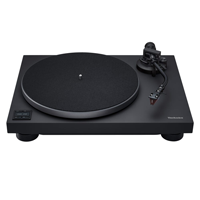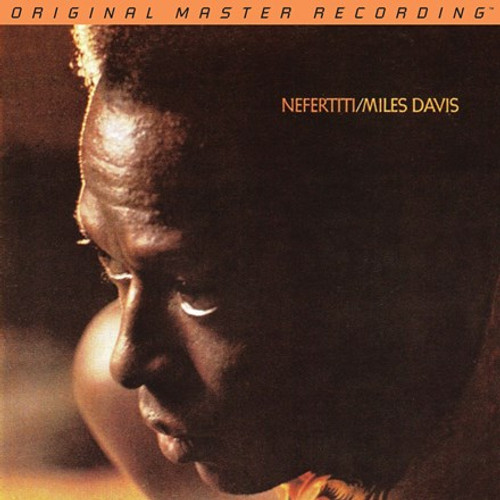Miles Davis Nefertiti (Numbered 45RPM Vinyl 2LP)
Full Details
The Last All-Acoustic Outing from Miles Davis' Second Great Quintet: Nefertiti Is Steeped in Inquisitive Interplay and Subconscious Impressionism
1967 Album's Tonal Shadings, Gradations, and Textures Come Alive on Mobile Fidelity's Numbered-Edition 180g 45RPM 2LP Set
1/4" / 15 IPS analog master to DSD 256 to analog console to lathe
Nefertiti will always be also known as the final all-acoustic record made by Miles Davis' Second Great Quintet. A thematic bookend to the preceding Sorcerer, the 1967 set shares much in common with its equally nuanced predecessor yet deviates by way of its focus on rhythm and exploratory soundscapes. The low-key music blooms with colorful bouquets of shadings, gradations, and overtones that on Mobile Fidelity's edition bring listeners to closer to the creative passions than before.
Sourced from the original master tapes and pressed on 180g 45RPM vinyl, this collectible audiophile version of Nefertiti is afforded supreme dynamics and full-range extension. Melodies resonate with a moody character and ambience normally only heard in small jazz clubs. Instrumental pitch, too, is spot-on accurate, a measuring stick for how all acoustic-based passages should be experienced.
As he does on Sorcerer, Davis again cedes all compositional duties to his all-star band mates and focuses on his trumpet. Familiar albeit slightly dissonant, rooted in hard bop yet signaling the onset of fusion, the songs are grounded in inquisitive interplay and subconscious impressionism. Nefertiti reveals fresh devices and new directions every time you visit its cerebral worlds. And while each musician is given ample room to solo, the effort stands as an example of groupthink in that no individual stands out or shows off. The groundbreaking title track – during which the horn section recurrently repeats the melody as drummer Tony Williams and bassist Ron Carter improvise, thus inverting the conventional sense of a rhythm section – shines as a textbook example of such chemistry and unity.
Throughout, the players' confidence, and Davis' trust in them, stamps every piece with rare self-assurance and authoritativeness. In particular, Williams and Carter bring rhythms to the forefront as the horns hypnotize and Herbie Hancock's piano points in several different directions like a compass gone crazy. Responsible for "Madness" and "Riot," Hancock contributes brief bursts of speed and slight aggression, but on a record on which complexity and introspection take precedent over blowing hot, the aural steam ultimately becomes opportunity for burrowing into unpredictable turns and deep grooves.
The thrilling sense of interplay and inclination of the ensemble to keep searching, moving forward in a concerted manner to uncover then-unheard jazz discoveries, marks Nefertiti as one of Davis' quintessential efforts. For historians, it's the signpost to the pioneering fusion the leader would begin to pursue with greater commitment on the record's follow-up, Miles in the Sky. For the rest of us, the album is music and music-making at its intriguing best.
"There was an unpleasant dryness and starkness to the sound of these originals accompanied by unpleasant grain. That is why it is easy to write that these three reissues [of Sorcerer, Nefertiti, and Filles de Kilimanjaro] from Mobile Fidelity sound far superior to the originals. They are far more transparent, detailed and texturally more supple as well as being harmonically more fully fleshed out."
—Michael Fremer, Analog Planet
Track Listing
Side A:
- Nefertiti
- Fall
Side B:
- Hand Jive
Side C:
- Madness
Side D:
- Riot
- Pinocchio






































